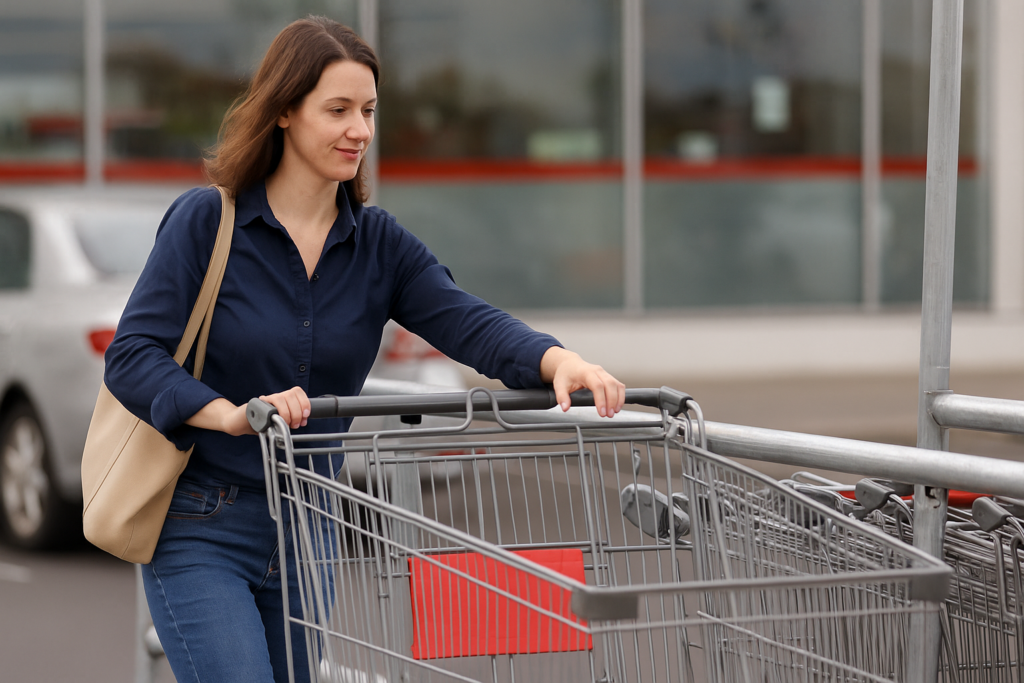Picture the end of a grocery run. You’re juggling bags, your phone is buzzing, and the parking lot feels like a toaster oven. Plenty of shoppers give their cart a gentle nudge toward the nearest curb stop and escape. Yet some folks march the extra meters to the corral every single time.
That tiny, no-one-is-watching moment says a lot about how a person’s mind works.
Psychologists treat small “pro-social micro-behaviors” (like picking up litter or holding a door) as windows into deeper traits that show up across life—at work, in relationships, even in long-term health.
Below are nine research-backed patterns you’ll often find in the dedicated cart-returner.
1. They’re naturally conscientious
Return-ers tend to score high on conscientiousness—the Big Five trait linked to punctuality, reliability, and “finish-what-you-start” energy.
Studies show that conscientious people volunteer more, donate blood more often, and generally pitch in without being asked.
Why it matters day-to-day: They’re the co-worker who double-checks the meeting link, the roommate who actually scrubs the pan, and the friend who remembers your birthday without Facebook’s nudge.
2. They respect community norms
Social-psychology pioneer Robert Cialdini found that when a space feels orderly, people copy that order; when it’s messy, they copy the mess. It’s called the Focus Theory of Normative Conduct.
Cart corrals broadcast the tidy norm, and cart-returners reinforce it.
Real-life ripple: Communities with strong “small norms” (pick up after the dog, park between the lines) often see lower rates of bigger norm-breaking like vandalism or theft.
3. They empathize with the unseen worker
Research on empathy and prosocial behavior shows that when we vividly imagine the person affected by our choice—a tired employee corralling stray carts in 35-degree heat—we’re far more likely to help.
In practice: These people notice the barista’s name tag, tip the delivery rider, and ease a stranger’s stroller over the curb. Their radar picks up human effort.
4. They think long-term and resist impulses
High self-control predicts everything from better grades to lower debt and healthier relationships. In parking-lot terms: the impulse is “ditch the cart.”
The long-term view says “Do the right thing; future shoppers (maybe future you) will thank you.”
Everyday payoff: They’re the ones who meal-prep on Sunday so Tuesday’s lunch is sorted, or who choose a brisk walk over one more Netflix episode.
5. They do the right thing even when no one’s looking
Psychologists call this a strong internal moral identity—your sense of “I’m the kind of person who helps.”
When moral identity is deeply internalized (not performed for applause), prosocial actions spike—even in anonymous situations like a half-empty parking lot.
Key takeaway: These people clean the AirBnB, recycle at the picnic, and cite their sources in a group project—whether or not the teacher double-checks.
6. They have well-developed self-control “muscles”
Low self-control makes norm-breaking tempting; high self-control makes the extra walk easy.
Experiments show that depleted or chronically low self-control predicts more littering, speeding, and rule skirting.
Quick hack they often use: Small implementation intentions—“When I unload the bags, I’ll push the cart straight to the corral”—turn effort into habit.
7. They feel personally responsible for the environment
Cart return is a micro form of pro-environmental behavior: keeping parking lanes clear lowers accident risk and property damage, which means fewer repairs and less waste.
Studies link a sense of personal obligation for the planet with higher rates of everyday green actions.
Bigger picture: These are the neighbors who rinse out the peanut-butter jar before tossing it in recycling and who bring their own cup to the coffee shop.
8. They spread “prosocial contagion”
Behavior is contagious. Classic field experiments on littering show that when one person models tidy behavior, onlookers copy it—even if they never interact.
By steering their cart neatly home, return-ers give everyone else a silent nudge toward cooperation.
Why leaders love them: In offices, they’re the first to straighten chairs after a meeting or jump on a small glitch before it snowballs, setting the tone for the team.
9. They practice micro-kindness—and feel good doing it
New well-being research finds that tiny, everyday acts of kindness predict higher happiness, resilience, and optimism. Putting the cart away takes—what—15 seconds? That’s a pocket-sized mood booster, and people who seek those boosts keep repeating them.
Personal upside: Kindness hits the brain’s reward system. The mini dopamine spark you get from that final push to the corral conditions you to repeat the habit next time.
Wrapping it up
A shopping cart isn’t just a metal basket on wheels; it’s a personality quiz with squeaky bearings. If you’re part of the “always return it” crew, give yourself a nod—you’re flexing traits that make neighborhoods safer, workplaces smoother, and relationships warmer.
And if the cart has ever tempted you to take the lazy route, no sweat. Next grocery run, try the extra walk. You won’t just tidy a parking lot; you’ll practice conscience, empathy, self-control, and kindness—all in one 20-step stroll. Your future self (and the next shopper hunting for a cart) will be glad you did.
















